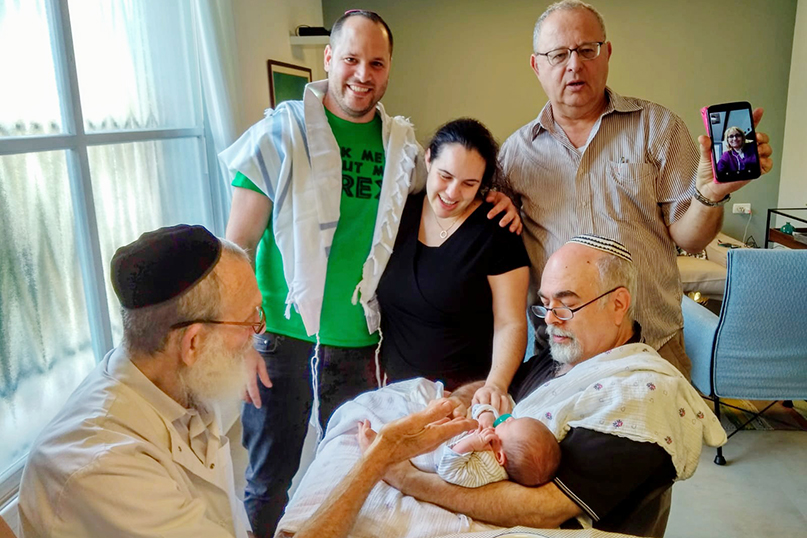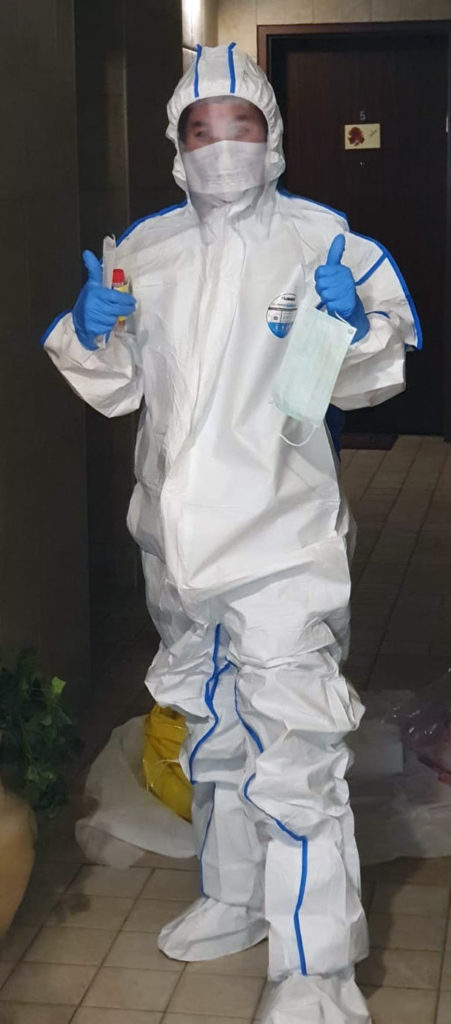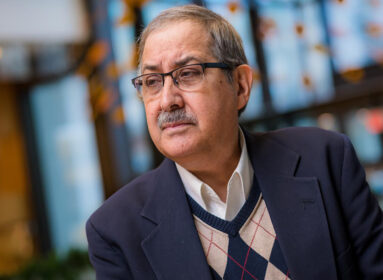
Crossing Continents – A Connecticut family with their heart, soul…and children, in Israel
By Stacey Dresner
HARTFORD – When Anat and Etan Markus’s three children made aliyah to Israel, the couple were a bit surprised.
Both Anat and Eitan were born and raised in Israel, but they have lived in Connecticut for 30 years. All three Markus children are American born.
“I don’t think I expected them all to make aliyah,” says Anat. “I definitely expected they would spend some time in Israel.”
“I think it was interesting for us to see that happen,” adds Etan. “And to see it happen with all three. It wasn’t going to be a surprise if one did it, or maybe two. But all three was definitely a surprise.”
The Markus’ son, Dror, 30, is getting his doctorate in Big Data polling at Hebrew University; Hadar, 29, lives in Tel Aviv with her husband, Netanel, and recently gave birth to her first child; and Talya, 27, is a fourth-year medical student at Hadassah Medical School in Jerusalem, married to Menachem.

All three children attended the Bess and Paul Sigel Hebrew Academy (now part of New England Jewish Academy) and Hall High School, in West Hartford, where the family lived until the kids made aliyah and Anat and Etan moved to Mansfield, to be closer to the University of Connecticut, where Etan is a professor and researcher.
Over the years, the family spent a lot of time in Israel where nearly all of their family still lives.
“Our parents always made sure that we had a strong connection to Israel, whether by visiting Israel in the summer, living in Israel while my dad was on sabbatical, eating Israeli food at home or being active in organizing or supporting any activity in our community that was related to Israel,” Talya told the Ledger in an email. “That strong connection, together with my two siblings’ great examples of making aliyah and joining the army before me, strengthened my desire to make aliyah.”
“I think the key is they enjoy life there,” said Anat. “Israel is a fun place to be.”
“They find it socially, much more enriching. They talk about the rich social relationships they have there, which are much deeper than anything they ever had here in the U.S.,” Etan explains. “When you go to the army, you have a different situation. You bond with the people you work with and live with and you develop trust. There is a lot of cohesion that happens.”
Living far away from your children can be difficult under normal circumstances. Now with the coronavirus pandemic, extended families are left wondering when they will be reunited.

Still, like typical Israelis, the Markuses are stoic and philosophical, refusing to panic, even though Talya is among a group of Israeli med students volunteering to man the drive-through COVID-19 testing site set up by Magen David Adom in Teddy Kollek Stadium. She also helped out in a COVID unit, taking temperatures and assisting the overextended nurses.
“Regarding Covid, I have seen what it can do to a country/population if not dealt with seriously enough,” Talya explains. “I think it is every person’s duty to do what they can do to help avoid such a catastrophe, whether it be by working in the hospital, creating a support system so that those at risk can stay home, or even just staying home in order to slow the spread and not overwhelm the health system. If as a medical student I am given the opportunity to help by testing for Covid and by working in the corona ward, then I feel strongly that I must do so to my best ability.”
Despite Talya’s proximity to the frontlines, Etan says that they are not worried about their kids contracting coronavirus.
“Israel’s got one of the lowest death rates. They are dealing with it very well,” he says. “My mother is in assisted living – the first assisted living that had the COVID virus in Israel, and there was a lot of concern when that happened. But they have done a phenomenal job there [at the assisted living center], both preventing the spread and taking them shopping…Israel has really been on the ball when it comes to this.”
The only family member who has come down with coronavirus has been Talya’s father-in-law, who lives in the Crown Heights section of Brooklyn, New York. Although he was hospitalized with COVID-19, he is now healthy.
In January, Hadar and her husband Natanel had their first child, a son, named Maayan. Luckily, the baby was born just before Israel was hit by the coronavirus, so both Anat and Etan were able to spend time in Israel with their new grandchild. (Anat was unable to be there for the bris, but arrived soon thereafter.)
“We got to see him; got to change diapers; got to see them through those first three horrible weeks,” Etan laughs.
Back in the U.S. forPassover, Etan and Anat had no plans this year to spend the holiday with their children, who remained in Israel. Instead, they had invitations to seders from friends.
But, ironically, due to the coronavirus, which left them confined to their home, and the advent of Zoom, which made it possible for them to spend “quality time” with their children, the Markuses had the seder with the kids.
“This year we were going to be without them, but we ended up doing a Zoom seder actually before the chag [holiday],” Etan says. “We wouldn’t have seen them if not for this, and it was wonderful. They didn’t want to do it during Passover, so we started it at 5 p.m. their time. The funny thing with this was, 5 in the afternoon their time is 10 in the morning our time. One of them mentioned the fact that Anat and I could still eat bread.”
“We showed them a photo of us burning the chametz as we were doing the seder,” says Anat, with a laugh.
With Yom Hazikaron, the day of remembrance for Israel’s fallen soldiers and victims of terrorism, on the calendar this week, Anat and Etan reflected on what the commemoration means to them as sabras – native Israelis – living in America.
“We are very thankful that the community in West Hartford always holds a memorial event or service,” Anat says. “It comforts us to see them commemorate a unique day that is important to Israelis that Americans also appreciate. And it is very meaningful to us to see the rabbis and the community leaders show up. Israeli’s are very sensitive to Yom Hazikaron. When you are mourning and in pain, you want to know that you are not the only one.”
In Israel, Talya said she doesn’t feel any different from other Israelis during Yom Hazikaron.
“That is, I don’t feel ‘American’ or like an outsider. I served in the IDF, my family served in the IDF, my friends served in the IDF, and even today I have friends and family who are or will soon be serving in the IDF and in the reserves.
“I remember my anxiety while friends were taking part in Operation Protective Edge and can’t imagine what it would be like to lose them. Thankfully, I don’t personally know someone who died fighting for Israel but I have friends who do and on Yom Hazikaron I try to hear their stories.”
And the winner is…?
5 key takeaways about the Gantz-Netanyahu deal and Israel’s new government
By Ben Sales
(JTA) – Israel finally has a government.
On Monday, Prime Minister Benjamin Netanyahu and chief rival Benny Gantz signed an agreement to form a coalition government together. The deal ends more than a year of deadlocked elections and political stalemate.
Since March 2019, Israelis have gone to the polls three times and, on each occasion, essentially delivered a tie between Netanyahu and Gantz. Neither of the first two elections resulted in a governing coalition and ended up triggering yet another vote.
With no end in sight to the politicking following the latest election, in early March, and the coronavirus crisis weighing on the country’s citizens, Gantz made the shocking move to join Netanyahu – someone he has called unfit for office due to corruption allegations – and break apart his own centrist political group, Blue and White.
Their deal is multifaceted and involves an agreement that Gantz would become prime minister in 18 months – but Netanyahu got his competitor to accede to many political demands. Here are five main takeaways from the new government.
The Israeli government is back in business – and wants to tackle the coronavirus.

Gantz ran his entire campaign, for more than a year, on the need to unseat Netanyahu. He’s reneging on that promise, he says, so that Israel can overcome a more urgent challenge – the coronavirus pandemic.
Coordinated action on the pandemic has been forestalled until now because Netanyahu, as caretaker prime minister, did not command a majority in Israel’s parliament, the Knesset. That rendered the government unable to pass and enforce major legislation.
According to Monday’s deal, the new government was formed to solve that problem. It will dedicate its first six months to passing legislation related to the coronavirus. Any other legislation would require the approval of both Netanyahu and Gantz to advance.
“We left our comfort zone to work from the inside,” Gantz said in a speech Tuesday. “We would rather beat the coronavirus than win on social media.”
Gantz’s move has split his supporters. Some, including his former second-in-command, are calling him a cheat. But other voices in Israel and abroad say he demonstrated leadership in the face of crisis.
Netanyahu is still prime minister, at least until next year.
On paper, the deal looks like a win for Netanyahu. For more than a year, Gantz came extremely close to unseating the longtime leader through maneuvers and deals with various parties to form a coalition.
Now Netanyahu gets to keep the job he’s held for more than a decade.
That’s especially significant because Netanyahu is under indictment for fraud, bribery and breach of trust, with his trial set to begin in May. He’s the first sitting prime minister to be indicted.
The coalition agreement says Gantz will take over in 18 months, and mandates that the Knesset pass legislation to that effect. To prevent Netanyahu from breaking up the coalition and calling new elections prior to that time frame, the legislation will state that if new elections are called, Gantz automatically becomes prime minister in the interim.
In the meantime, Gantz will be defense minister and deputy prime minister. His allies will head the Foreign Ministry and Justice Ministry, while Netanyahu’s Likud party choices will get the Finance Ministry and the speakership of the Knesset.
There’s a small Gantz win in there: Netanyahu had sought the Justice Ministry because he’s under indictment, and it would have given him a measure of influence over the judicial system.
The agreement also makes it difficult for Netanyahu to avoid handing over power to Gantz, one way or another. But 18 months is a long time in Israeli politics and Netanyahu is still in the top job. He’s also a historically savvy political operator who has weathered all kinds of challenges to remain in power, so this is no guarantee for Gantz.
In the meantime, Gantz’s former coalition is in tatters. He once commanded the largest bloc of lawmakers in the Knesset, but that party is now split and the subgroups are at odds with each other. His former No. 2, Yair Lapid, called the coalition agreement a “deceit” and said “I apologize to everyone who I convinced over the past year to vote for Benny Gantz.”
But Netanyahu is still going on trial.
One thing that hasn’t changed is Netanyahu’s trial date: May 24. In the past, the prime minister has sought legislation that would give him immunity while in office. That does not appear to be on the table now.
But Netanyahu did improve his position a bit in the coalition deal. He gets veto power over the appointment of the next attorney general and state prosecutor, and can choose half the committee to appoint judges.
And if the Supreme Court disqualifies Netanyahu from remaining prime minister due to his indictment, the agreement automatically triggers new elections.
Israel is now preparing to annex parts of the West Bank.
Another significant result of the agreement: Israel will now likely annex parts of the West Bank, beginning as soon as this summer.
One of Netanyahu’s key campaign promises was to extend Israeli sovereignty to portions of the territory, which most of the international community views as illegally occupied. Last year, Netanyahu promised to annex the Jordan Valley, a wide swath of territory on the eastern edge of the West Bank, and the peace plan released by the Trump administration in January greenlights Israeli annexation.
Gantz also praised Trump’s plan.
Palestinian leaders uniformly oppose any Israeli annexation of the West Bank, which Palestinians view as the territory of their future state.
But the coalition agreement allows Netanyahu to put annexation of portions of the West Bank up to a vote beginning July 1, provided the United States still supports the move. If Netanyahu can get a majority, annexation would likely move forward.
We’re still in uncharted territory.
The biggest thing to remember, amid all of this political wrangling, is that this entire situation is unprecedented. Israel has never held three consecutive rounds of elections. It has never had a sitting prime minister about to stand trial for corruption. It has never faced a pandemic like this.
There have been unity governments before, where the two largest parties form a coalition, and they’ve yielded mixed results. The most famous example occurred from 1984 to 1988, when the Labor and Likud parties successfully shared power and split the prime minister’s office. In 2012, a short-lived unity government under Netanyahu broke apart after a couple months.
Israeli politics is famously tumultuous, and it’s soared to a new level in the past year. So as the new coalition takes shape and begins to govern, prepare to be surprised again. Somehow.








 Southern New England Jewish Ledger
Southern New England Jewish Ledger









